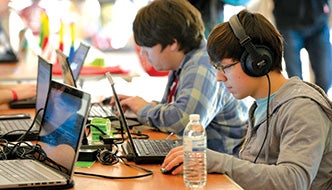Last month, nearly 500 students from over 60 colleges and universities from the Northeast, along with students from several high schools, traveled to the Rensselaer campus to participate in the first 24-hackathon hosted by student members of the Rensselaer Hackathon organization.
The event, dubbed “HackRPI,” was coordinated by a team of students that included Jacob Martin ’16, Jazmine Olinger ’16, Robert Rouhani ’16, and Sebastian Sarbora ’16, along with support from over 60 student volunteers. According to the organizers, the word “hackathon” is a combination of the words “hack” and “marathon,” where “hack” is used in the sense of playful, exploratory programming, not its alternate meaning as a reference to computer crime.”
For the duration of the event, the Darrin Communications Center served as the central hub—and temporary home—for the avid student hackers focused on creating projects in areas of technology that addressed hardware, web, data, mobile, video game and virtual reality, and the humanitarian fields.
“Hackathons let students explore new technologies and collaborate with one another, all while having fun,” said Sarbora, a dual major in computer science and electrical engineering, who also serves as vice president for the Rensselaer Hackathon organization. “Hackathons are a more engaging way for students to learn about software development than traditional schoolwork. RPIHack is the first intercollegiate hackathon hosted at Rensselaer completely organized and run by students, so this was a great learning experience for all of us involved.”
“We chose to organize HackRPI because we didn’t want to wait for someone else to start it,” said Olinger, a dual major in computer science and mathematics, who says that she became interested in programming in ninth grade.
Hackathons let students explore new technologies and collaborate with one another, all while having fun.” —Sebastian Sarbora ’16
“Creating a project from start to finish can be time-consuming but very rewarding,” Olinger added. “There had been a few other students who said they wanted to start HackRPI. We knew this was an event that the campus needed, and that it was on our shoulders to implement. By attending several hackathons across the country, we found ourselves taking the roles of finalists, winners, judges, and volunteers. Through all of this, we have seen the things we love about hackathons, and the things we believe should be changed.”
This year, some winning projects included: a social media app to connect at-risk LGBT and minority mentees with a mentor, a Tweet Typer that pulls down and types out live tweets on a typewriter, a web app that retrieves data from hand gestures using Leap Motion, an alarm clock Web service, a file programming language, and a Web application that make music listening more social.
“I’ve always been interested in developing and scripting video games,” said Martin, a dual major in management and computer science. “A hackathon is a time and a place for you to make something. It doesn’t matter if it’s a Web app, a mobile app, a desktop app, or something in between. It’s also a great way to meet other students who have similar interests in programming or a desire to learn code.”
Due to the timing involved in creating quick projects over an allotted period, hackathons are also known for attracting the attention of major technology companies that may often provide career opportunities, mentorship, food, and cash prizes. Representatives from Major League Hacking and several corporate sponsors, including Bloomberg, Bose, Google, Microsoft, IBM, International Business Machines, PitneyBowes, TripAdvisor, and many more supported the event.
For more information, visit the HackRPI website.
—Jessica Otitigbe


